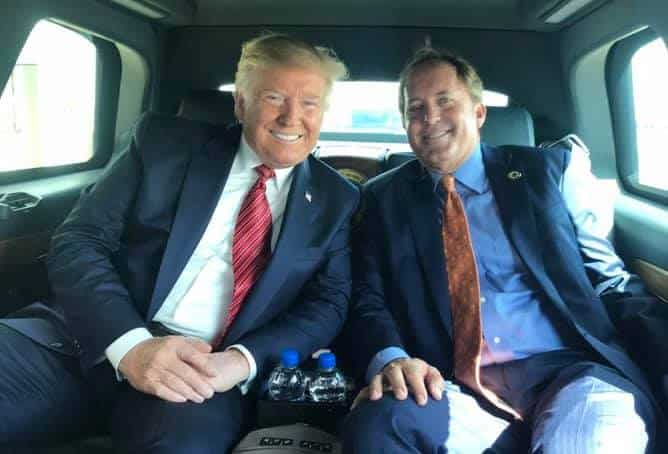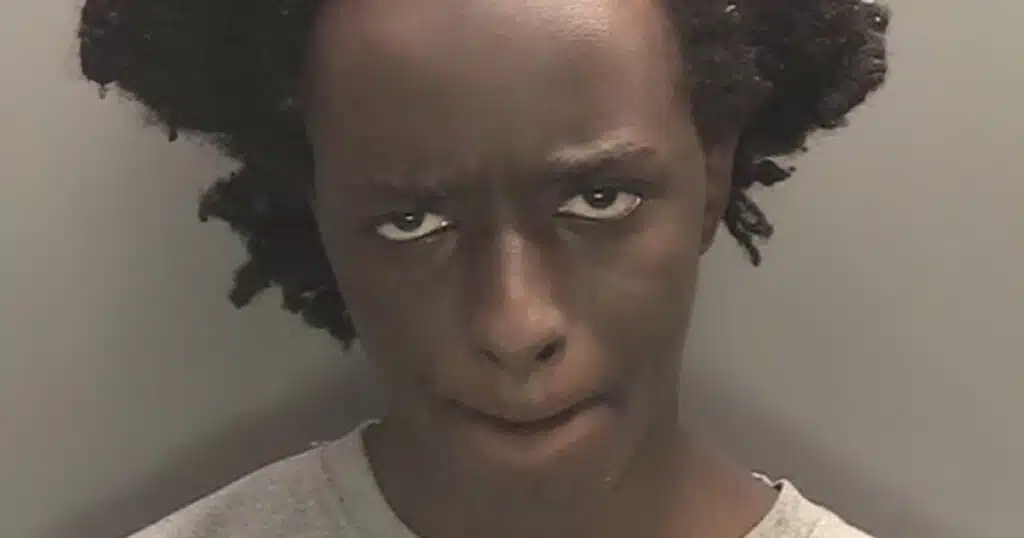
Analysis: Failed Impeachment Effort Will Turbo-Charge ’24 Texas GOP Primary
Paxton, as an ally of Donald Trump, was already no friend to the moderate establishment running the Texas House. The impeachment trial represents the tug-of-war going on between America-first conservatives and other Republicans across the nation.
In a once-in-a-century proceeding of the Texas Legislature, the state Senate voted today to acquit its suspended Attorney General of all impeachment charges.
The House voted to impeach Texas Atty. Gen. Ken Paxton in May, which required a Senate trial to convict. The Senate trial began earlier this month. See below for the vote tally on each article of impeachment.
Following acquittal, Paxton now returns to his post after a temporary suspension.
The process, during which the conservative Paxton was largely and voluntarily absent, was attended by his wife, Sen. Angela Paxton, who was not allowed a vote. At the forefront of the charges against Paxton were accusations of bribery, adultery, and punitive actions against “whistleblowers” among the AG office executive staff. It was a process marked by several dramatic moments, including dumpster contents being lit afire outside the state building holding the AG’s executive offices.
Paxton said in a statement he won the election previously and called the articles “absurdity” and “coordinated by the Biden administration” and House Speaker Dade Phelan. He thanked his wife and family for standing by him.
“Today, the truth prevailed. The truth could not be buried by mudslinging politicians or their powerful benefactors. I’ve said many times: Seek the truth! And this is what was accomplished,” Paxton wrote. “The sham impeachment … cost millions of dollars, disrupted the work of the Office of Attorney General, and left a dark and permanent stain on the Texas House.”
Republican Lt. Gov. Dan Patrick, breaking his silence as moderator of the proceedings, accused the Texas House of “ramming through” impeachment charges with barely any time for House members to study the evidence. By comparison, the 1917 House impeachment proceedings of Gov. James Ferguson, he said, was run like a full court trial. Patrick called for future amendments to the Texas Constitution to reform the many factors “that allowed this flawed process to happen.”
“This is not a partisan issue. We owe it to future legislators that no one is subject” to the process that was used, Patrick added before signing the final judgment. “… Millions of dollars have been wasted on this impeachment” putting business and family matters on hold, for no extra pay for part-time House members or senators.
Patrick called for full audit of spending during the impeachment process.
In a press conference, Republican Rep. Andy Murr, a key part of the House prosecution, painted Paxton as an “out of control attorney general who refused to listen to the desperate warnings” or the whistleblowers. “Mr. Paxton has never fully explained why he was so determined to help one person, Nate Paul, over the warnings of his employees.”
Murr, responding to questions from the media, added the House impeachment charges were derived over a “compressed” two-week time period, though he said he would not have done anything differently.
Paxton won re-election to the office less than a year ago in November. He retained his office 53-44% against a rather inactive Democratic challenger, having previously beaten then-Land Commissioner George P. Bush 68-32% in a primary runoff — and this after emerging from a four-way primary featuring Bush, exiting Texas Supreme Court Justice Eva Guzman, and Congressman Louie Gohmert.
Included below the following analysis is a breakdown of the articles of impeachment and the vote taken on each article.
FROM THE HIP: Legislative observers are almost universally predicting today’s decision will have significant impact on the 2024 Republican Primary. Voters now have a rare, high-profile state issue to base their decision on when choosing their next state representative or senator — how that affects an incumbent (of course) depends on the political dynamics of the district and the popularity of the member.
In the more conservative districts, activists are already sporting “RINO hunter” gear and vowing to flush out any incumbent who voted to expel Paxton. Whether they believe Paxton was skirting the lines of ethics and legality or not, many claim he won a Primary Runoff (against Bush) handily and then the general election, with almost all details of the impeachment charges known at the time. Therefore, any effort to impeach would have been viewed as treason against the voters. Some have pointed out the whistleblowers complained to the FBI as a first step with scant evidence rather than the governor’s office — and that the whistleblowers, therefore, must see the AG’s office as an extension of the federal law enforcement system. Paxton has long been a critic of the overreach of federal agencies such as the FBI, the SEC, etc.
Democrats were busy cheering the impeachment articles against “Crooked Ken,” and mirroring talking points by moderate Republicans and conservatives upset by Paxton’s handling of personnel issues in the AG’s office. Their points are included in the impeachment articles below.
The entire scenario was summed up best by those taking the stand during the trial on the Senate floor. Tony Buzbee, lawyer for the Paxton defense, was brash concerning his disregard for the process, calling it a “witch hunt,” and that allies of the Bush family were allegedly behind the scenes pulling the strings. Rep. Jeff Leach, who spoke during the closing arguments for the House prosecution, claimed that Paxton was a mentor, “brother in Christ,” and a friend (ed. note: before Leach had left the Texas Freedom Caucus and was given a chairmanship by the Speaker). He and others had succumbed to pressures such as bribery and adultery, and that it was time for Paxton to leave office, conviction or no conviction.
Will voters remember their current feelings on the impeachment saga in a handful of months and after a winter holiday cycle has yet to be determined. However, a third special session — for school choice — is expected this fall, which may keep memories of the impeachment proceedings fresh.
IMPEACHMENT VOTE RESULTS:
Note: It takes 21 votes to affirm an article and convict, or Paxton is therefore acquitted on that particular charge. A boxed check mark “☑ ” means convicted and an “☒” means acquitted.
☒ ARTICLE 1 – Protection of charitable organization (14 yays-16 nays)
Paxton is accused of directing his employees in the attorney general’s office to intervene in a lawsuit brought by the a charitable foundation against entities controlled by Austin property investor Nate Paul, harming the Austin charity to protect Paul, according to the Associated Press.
☒ ARTICLE 2 – Abuse of the opinion process (14-16)
The Texas AG is accused of misusing his official power to issue written legal opinions. He allegedly had employees prepare an opinion that protected some of Paul’s properties from being sold in foreclosure. Paxton concealed his actions by asking a Senate committee chairman, Bryan Hughes, to seek that opinion. Paxton is accused of directing employees to revise their legal conclusion to help Paul, according to the AP.
☒ ARTICLE 3 – Abuse of the open records process (14-16)
Paxton is accused of misusing his official power by allegedly interfering with his office’s handling of a public records request dealing with the files of a criminal investigation into Paul, according to the AP.
☒ ARTICLE 4 – Misuse of official information (2-28)
Paxton is accused of misusing his power to obtain previously undisclosed information held by the AG’s office to benefit Paul, according to the AP.
☒ ARTICLE 5 – Engagement of Cammack (13-17)
Paxton is accused of misusing official powers by hiring attorney Brandon Cammack to investigate a suspicious complaint made by Paul. That led to Cammack issuing more than 30 grand jury subpoenas, according to the AP.
☒ ARTICLE 6 – Termination of whistleblowers (14-16)
Paxton is accused of violating the Texas “whistleblower law” by retaliating against employees, terminating them without good cause or due process, according to the AP, and then maligning their reputations.
☒ ARTICLE 7 – Whistleblower investigation and report (14-16)
Paxton is accused of misusing public resources by directing employees to conduct a for-show investigation into terminated employees’ whistleblower complaints and publish a report containing dubious statements in Paxton’s defense, according to the AP.
☒ ARTICLE 8 – Settlement Agreement (8-22)
Paxton is accused of misusing his official powers by concealing acts in connection with the whistleblower’s complaints by entering into a settlement with the whistleblowers that provides for payment from public funds, according to the AP. The settlement stopped the wrongful termination suit and delayed the discovery of facts and testimony at trial, to Paxton’s advantage. That allegedly prevented voters from making a fully informed decision when voting in 2022.
☒ ARTICLE 9 – Paul’s employment of a woman with whom Paxton has acknowledged having an affair. (12-18)
According to the AP, it is alleged that Paxton benefited from Paul’s decision to hire a woman with whom Paxton allegedly had extramarital sexual relations. In exchange, Paul allegedly received favorable legal assistance from the attorney general’s office, and some special access to the office.
☒ ARTICLE 10 – Paul’s providing renovations to Paxton home (14-16)
It is alleged that in exchange for providing the renovations, Paul received favorable legal assistance from, or specialized access to, the attorney general’s office, according to the AP.
☒ ARTICLE 15 – False Statements in Official Records (14-16)
It is alleged that Paxton made multiple false or misleading statements in the lengthy written report issued by his office in response to whistleblower allegations, according to the AP.
☒ ARTICLE 16 – Conspiracy and Attempted Conspiracy (14-16)
Paxton is accused of conspiring or attempting to conspire with others to commit acts described in the articles, according to the AP.
☒ ARTICLE 17 – Misappropriation of Public Resources (14-16)
Paxton is accused of misusing his official powers by causing employees to perform services for his benefit and others, according to the AP.
☒ ARTICLE 18 – Dereliction of Duty (14-16)
Paxton is accused of violating the Texas Constitution, his oaths, various statutes, and laws against public officials acting contrary to the public interest by engaging in acts described in the articles, according to the AP.
☒ ARTICLE 19 – Unfitness for Office (14-16)
Paxton is accused of engaging in misconduct, private or public, as shown by the acts described in the articles, according to the AP.
☒ ARTICLE 20 – Abuse of Public Trust (14-16)
Paxton is accused of using his official powers to subvert the government and obstruct justice, as shown by the articles, according to the AP.
____
The Senate held the following articles “in abeyance” during the trial and did not take them up. The Senators voted not to take a vote on each.
ARTICLE 11 – Abuse of judicial process
ARTICLE 12 – Abuse of judicial process
ARTICLE 13 – State Securities Board investigation
ARTICLE 14- Personal financial statements
Updates: 1:10 p.m., 1:21 p.m., 2:15 p.m.
This article originally appeared in The Hayride.



